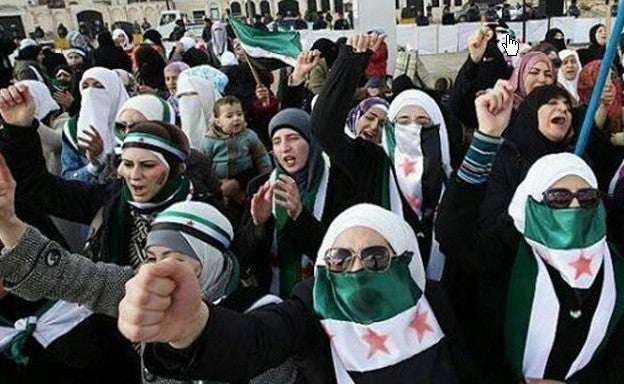
Title: Solutions for Syria: a Roundtable Discussion with Syrian Journalists and Civil Society Leaders

Against Assad and Also Against ISIS
Scharff began by asking the speakers what they thought people outside of Syria should know about the current situation. One panelist, a Syrian civil leader, wanted to clarify that many people believe that the conflict in Syria is simply Syrian President Bashar Al-Assad and ISIS fighting one another. Because of this confusion, people tend to assume that Syrians who are against the regime stand with ISIS, which is untrue. Most are against the regime, but are also against ISIS and other Islamists in the country. The civil leader expressed frustration saying, “I keep saying ‘no, we are civil society, we are not with ISIS, most of the ISIS leaders were released from the Syrian prison—actually, Syrian regime prison.’” She also stated that many Arab countries wanted the war in Syria to continue to set an example so that their citizens wouldn’t rise up against them.
Reporting about Syria
Scharff highlighted the danger that journalists face in Syria because of all of the attacks on the press. The Syrian journalist panelist pointed out that female journalists were somewhat rare because in Muslim communities in Syria, it is uncommon that women leave their homes to interview others. “Women,” she said, “have to face many challenges and fight on many frontlines, not only one,” a testament to the effects of war as well as the effects of a male dominated society.
One of the main challenges concerning reporting about Syria, however, is that most of the stories about Syria are focused on the military and political aspects, while stories about Syrians living through the war go largely unreported, according to the Syrian journalist. Additionally, there are obstacles to reporting since certain words and phrases are disliked by the Syrian government. “It’s so hard because sometimes I want to use a word that I know I’m not allowed to use because I’m in a place governed by security forces and by government, so I try to change it to another word. Like in regime-controlled areas, they like the word ‘terrorists’ and I don’t like to use this word, so I like to use maybe ‘opposition fighters’ or ‘rebels’, but I’m not allowed to use this. Sometimes I spend hours just trying to pick up good words that I’m satisfied with and I know they won’t put me in trouble with anyone,” the journalist said.
Women In Syria
Commenting on what women face in Syria, the Syrian civil leader panelist said, “[These] may be like really small basic things for you here, for example, to teach women how to do Facebook account, or how to write an email. It’s really basic things for here, but for women there it’s really a big issue.” And while women in and out of Syria are already very involved (this civil leader has delivered humanitarian aid with others frequently), they want to do more. They want to be trained in skills like accounting, and in self-representation. The speakers emphasized that when it comes to decision making in the peace negotiations, they want women at the table participating. It’s not enough, they said, to just be in the room and making suggestions or giving advice to the men at the table. They want to actively participate, and the Syrian Women’s Political Movement has demanded that at least 30% of the people involved in the peace negotiations must be women.
One topic that was brought up repeatedly was former UN Special Envoy on Syria Staffan de Mistura, who created a women’s advisory board on Syria. Though the advisory board consisted of women only, one of the speakers pointed out a glaring problem with it:
“This board also consists of women who are in their 50s, 60s, 70s maybe. With respect to all women, all sitting women, we would like to see our generation represented, because we were the people who were in the streets on the first day, and now we see we are excluded from everything.”
Regarding reconstruction after the war, the speakers agreed on strict conditions with the distribution of reconstruction money. “We want to see all war criminals taken to the Hague committee, or punished for what they’ve done in our country. We want also to make sure that all the rights of the people are secured, the rights in their homeland, the rights to know where their loved ones are,” the journalist explained. She also posed questions that need to be answered when the war is over: “How can we guarantee they have their own homelands and own properties while reconstructing the community and they are outside Syria? How can we know also the fate of around 200,000 detainees and disappeared people? We don’t know where they are.”